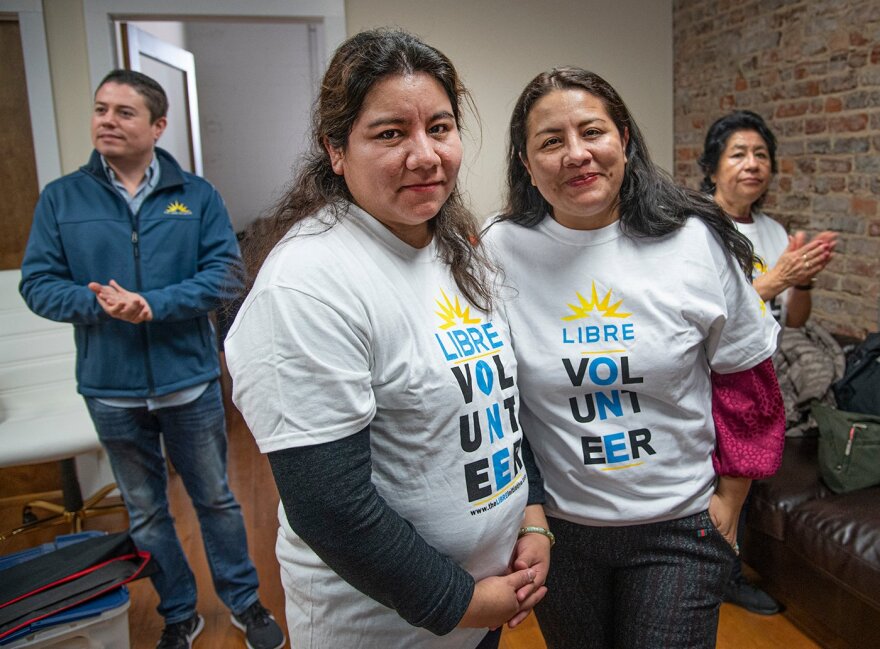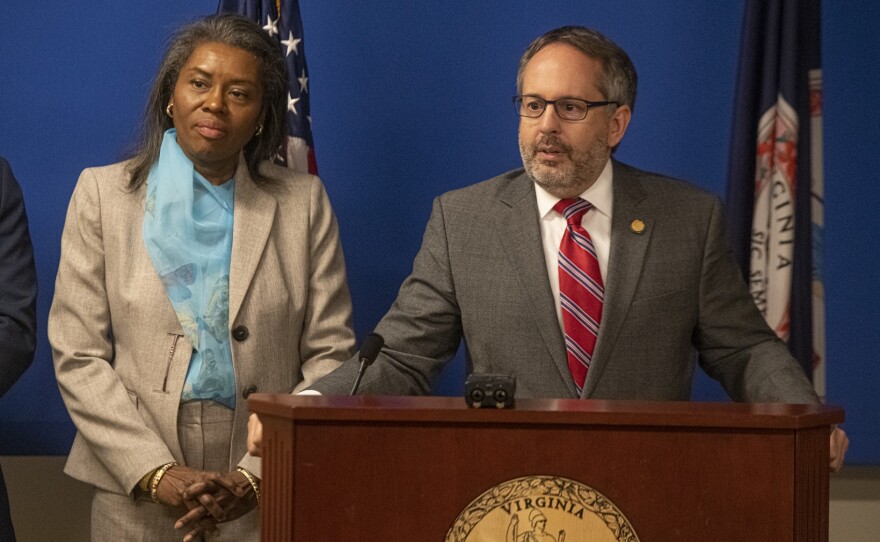Republican leaders and lawmakers are reviving the conversation about school choice in Virginia during this year’s General Assembly session. One piece of legislation they’ll be advocating for: a program allowing students who attend private school or are homeschooled to receive state funding.
In a press conference about the proposal Thursday, Lt. Gov. Winsome Earle-Sears used the national conversation about the science of reading to highlight problems with public schools. She read from a 2021 Fairfax County NAACP letter that discussed years’ worth of resources spent on programs “rooted in the flawed literacy instruction.”
“The fundamental abilities to read, spell and write well should not be dependent on parental ability to hire tutors, to supplement school instruction,” Earle-Sears said.
Fairfax NAACP wanted Fairfax County Public Schools to fix its approach to literacy instruction. Earle-Sears’s solution to this issue, though, is different: Give parents money to opt-out of the public school system entirely.
“You've heard the underlying issue that children are not learning. And so, what we are saying as parents is, ‘No more,’” Earle-Sears said. “We're not going to do the same things and expect different results.”
The bill she’s promoting was crafted by groups including the Thomas Jefferson Institute for Public Policy, the Virginia Institute for Public Policy, EdChoice, Heritage Action, Institute for Justice and the Middle Resolution — according to Kris Allen, the Middle Resolution’s policy director. Allen said the bill’s language was modeled on Arizona’s recently expanded school voucher legislation passed in June.
Multiple pieces of similar legislation failed to gain the support of Virginia Democrats last year, and others have been vetoed in years prior under Democratic governors. It’s unclear whether this year will be much different, but below is a breakdown of the proposal — and what proponents and opponents have to say about it.
What is an education savings account and how would this one work?
An education savings account, referred to in the bill as a “success account,” is a voucher program. Under a current proposal from Del. Glenn Davis (R-Virginia Beach), a portion of state-funded per-pupil dollars would be deposited into an account managed by the Virginia Department of Treasury.
Parents would be authorized to use the ESA funds in myriad ways: tuition and fees at private schools, tuition at Virginia institutions of higher education, tutoring fees, curriculum materials, after-school or summer school programming and more. Up to 20% of the funds could be used on things like internet access and computer hardware.
During Thursday’s press conference, Davis estimated the average amount deposited would be around $6,300, but the specific amount would vary depending on locality. The Virginia Education Association estimates that families in some Northern Virginia districts would receive less than $1,000, because districts there receive less state funding.

Virginia parent Iveth Torres attended a Richmond rally in support of the voucher program with the LIBRE Initiative group on Thursday. She has two children, including a 15-year-old son attending public school in Woodbridge. She’d like to send him to a private Catholic school instead but said she can’t afford it.
“We don’t have enough money to pay for that school,” Torres said.
Denisha Allen said she benefited from another school choice program in Florida, where she went from making Ds and Fs in public school to As and Bs in a private school setting. Allen advocates for school choice in her role as a fellow for the American Federation for Children.
“I became the first in my family to graduate from high school,” Allen said. “I went on to receive my master's degree also. It’s legislation like this that's so monumental in changing the trajectory of students’ lives.”
Who would be eligible to receive funds through the ESA?
To qualify, a student would have to be a Virginia resident and enrolled in a public elementary or secondary school for at least one semester immediately prior to applying for an ESA account. Parents can also apply for an account when a student is starting kindergarten or 1st grade. If the student moves outside of the bounds of the public school district tied to that account, they’d no longer be eligible.
Once a student is enrolled in the ESA program, they cannot enroll in public school while receiving voucher funds. The student’s local public school would also be released from all obligations to educate the student. That includes students with disabilities.
Private schools don’t always offer the same protections and services that public schools are mandated by federal law to provide. This is one concern for advocates opposed to voucher programs, like the Education Law Center’s Jessica Levin.
“Voucher programs give money to private schools and private education providers that can discriminate, and pick and choose which students they want to admit, pick and choose whether they're going to discipline students for things like their sexual orientation, and pick and choose whether they're going to offer things like special education to students who need it,” Levin said.
Levin runs Public Funds Public Schools, a campaign to ensure public funds are only used to support public schools at the ELC, in addition to her role as deputy litigation director, arguing in court against voucher programs in states like Kentucky and South Carolina.
Earle-Sears said Thursday that the ESA program “is not about funding rich children’s education.” However, there is no income limit for parents to apply for the funds, unlike in some states — like New Hampshire, which limits funds to parents who make 300% of the federal poverty level or less, currently $83,250 for a family of four.
Chad Stewart, Virginia Education Association’s policy analyst, points out that the funds families could receive through an ESA account would cover a fraction of the cost of most private schools in the state. The tuition for private schools statewide is about $13,000 annually, and that goes up to around $17,000 annually when considering just middle and high schools.
While some private schools give out scholarships to low-income students, those that don’t receive them would have to come up with the difference themselves.
“You'd have to be a relatively high-income family with a lot of additional discretionary funding to be able to afford the average private school,” Stewart said.
Rob Shand, a professor of education policy at American University, has studied voucher programs in other states and said they tend to most greatly benefit more affluent families. He said the provision allowing families of kids just entering kindergarten or first grade to qualify for an account is “the loophole of how a lot of these bills wind up benefiting more affluent families.”
“Even if they target lower-income families, it still benefits families who are at the higher end of the income range because the kids entering kindergarten, very often, are kids who would have gone to private school anyway,” Shand said.
How would the program be governed, and what safeguards are in place to ensure dollars are only spent on authorized uses?
The legislation would require Virginia’s treasury department to submit regular expense reports documenting the specific, allowable education-related expenses for each account. It would also be required to provide annual reports on the number of students statewide who receive an ESA, the amount of funds sent to the accounts and the total dollar amount of per-pupil state funds transferred to them.
The bill also requires the treasury department to “eliminate opportunities” for parents to use the funds for unqualified purposes, though it provides no specific on how to accomplish that. If it’s discovered that someone was using the funds for unauthorized purposes, the student’s account would be terminated and the funds taken back.
Kris Allen with the Middle Resolution, who helped draft Virginia’s ESA bill, said he’d encourage the state to partner with outside vendors to ensure security. Jonathan Butcher, an education fellow at the Heritage Foundation who has also served on the boards of charter schools in Arizona and South Carolina, told VPM News last year that Arizona is working with an app called Class Wallet that automatically blocks unapproved transactions.
“In order to make a purchase, Class Wallet has to check that the purchase is allowable under the law,” Butcher said. “And if it's not, then they'll just block it. And so, it prevents fraud before it happens.”
What would these accounts mean for public school funding?
The bill language states that the ESAs would only draw a portion — which proponents estimate to be about one-third — of per-pupil state funds. The bill’s supporters say the rest of those state funds will stay with local school districts. Other funding sources — specifically federal and local dollars — aren’t transferred to the account, as outlined in the bill.
Proponents of the accounts like EdChoice — which was created by economist Milton Friedman — argued that school choice programs like ESAs actually increase funding for public schools and improve public school students’ performance.
“There’s a variable cost attached to every student that's enrolled in public schools. And what we're trying to do is take that portion of that variable cost and make sure that's attached to the student,” said Ben Knotts, legislative director for the Virginia chapter of Americans for Prosperity, a political action committee backed by businessman Charles Koch. “You won't lose teachers, you'll actually lower the student-to-teacher ratio, so that teachers can have more one-on-one time.”
However, researchers like Shand said there isn’t good evidence to support claims that voucher programs like ESAs don’t hurt public schools. In fact, his research estimated significantly increased costs associated with them.
“It's simply not true to state that the public schools are not losing money,” Shand said. “They are.”
Recent studies of states with large voucher programs also present a cautionary tale. A 2018 analysis in Milwaukee, Wisconsin, found that private schools with high voucher-student populations didn’t outperform public schools on state exams.
Sam Abrams, director of the National Center for the Study of Privatization in Education at Columbia University, recently wrapped up a soon-to-be-published study of school choice programs — including ESAs — in Florida and Arizona.
What he found was a dramatic increase in funding of voucher programs in both states corresponded with a decline in per-pupil education spending. Abrams said between fiscal years 2008 and 2019, per-pupil spending declined 12% in Florida and 6% in Arizona.
“It indicates that what this is fundamentally about is driving down the government role in education. And that comports with Milton Friedman's message,” Abrams said.
VPM News wants to hear your responses to one question: What do you want to learn about the most during the 2023 General Assembly session?



